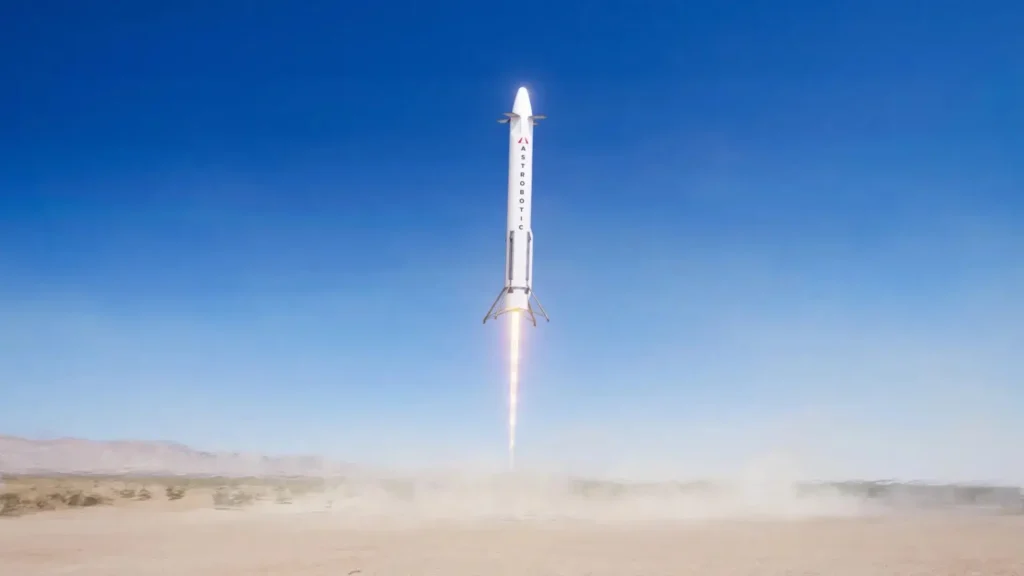In a strategic maneuver that marks a significant transition, Astrobotic’s Xogdor Rocket, renowned for its contributions to space exploration, is now venturing into the domain of defense with its groundbreaking reusable Xogdor Rocket. This move underscores the company’s commitment to innovation and its willingness to explore new frontiers beyond conventional space missions.
Table of Contents
Key Points
Strategic Move into Defense Sector: Astrobotic, known for space exploration vehicles, is venturing into defense with its Xogdor reusable rocket, aiming to test payloads at the edge of space.
Collaboration with U.S. Air Force: Astrobotics recently inked a cooperative agreement with the U.S. Air Force Research Laboratory to develop liquid rocket engine technologies and explore flight testing opportunities for Xogdor.
Versatile Applications: Xogdor’s reusability offers faster turnaround times for testing, making it suitable for suborbital atmospheric research, missile defense system testing, hypersonic weapons development, and even point-to-point cargo delivery.
Rocket Cargo Program: Astrobotic eyes the military’s “rocket cargo” program as a significant opportunity, with plans for Xogdor to demonstrate point-to-point flights over several kilometers and eventually achieve supersonic speeds.
First Fully Reusable Liquid-Fueled Platform: While most sounding rockets use solid propellant, Astrobotic aims for Xogdor to become the first fully reusable liquid-fueled platform for sounding rocket missions, potentially revolutionizing this sector.
Origins of the Xogdor Rocket
The inception of the Xogdor rocket traces back to Masten Space Systems, which Astrobotic acquired in 2022. Masten Space Systems embarked on the development of the suborbital Xogdor vehicle in 2021, laying the foundation for Astrobotic’s foray into the defense sector.
Strategic Vision
Sean Bedford, Astrobotic’s director of business development for propulsion systems, elucidated the strategic vision behind the Xogdor rocket. While the initial impetus stemmed from a NASA contract, Bedford revealed Astrobotic’s proactive stance in exploring applications catering to the Department of Defense. This strategic pivot aims to leverage the Xogdor’s capabilities for various defense-related endeavors.
Collaborative Endeavors with the U.S. Air Force
Astrobotic’s collaboration with the U.S. Air Force Research Laboratory (AFRL) Rocket Propulsion Division, based at Edwards Air Force Base, marks a significant milestone in the company’s defense-oriented endeavors. Through this cooperative agreement, Astrobotic and AFRL will synergize efforts in advancing liquid rocket engine technologies and exploring flight testing opportunities, signaling a robust partnership between the private and public sectors.
Potential Defense Applications
The versatility of the Xogdor rocket opens avenues for diverse defense applications. Its reusability translates into accelerated turnaround times between missions, facilitating more frequent testing opportunities. From suborbital atmospheric research to testing missile defense systems and hypersonic weapons, the Xogdor rocket emerges as a versatile platform poised to address multifaceted defense challenges. Additionally, its supersonic capabilities hold promise for simulating re-entry profiles of shorter-range tactical missiles, further expanding its utility in defense simulations.
Expanding Horizons: Rocket Cargo Program
One of the most promising prospects lies in the military’s “rocket cargo” program. While Astrobotic’s predecessors, such as the Xodiac and Xombie rockets, laid the groundwork with short-range point-to-point flights, the Xogdor rocket aims for unprecedented milestones. Its initial flight qualification campaign will encompass a progressive series of multi-kilometer point-to-point flights, demonstrating its prowess in approach and landing operations. With the evolution to the Block 2 variant, the Xogdor rocket is poised to achieve supersonic flight speeds, extended ranges, microgravity environments, and access to suborbital space, thereby revolutionizing the concept of rocket cargo missions.
Pioneering Reusability in Sounding Rocket Missions
In a domain largely dominated by solid propellant, Astrobotic endeavors to carve a niche for the Xogdor rocket as the first fully reusable liquid-fueled platform for sounding rocket missions. This pioneering effort underscores Astrobotic’s commitment to pushing the boundaries of innovation and redefining paradigms in space exploration and defense applications.
Conclusion
Astrobotic’s strategic foray into the defense sector with the Xogdor rocket heralds a new era of collaboration and innovation. With its transformative capabilities and strategic partnerships, the Xogdor rocket is poised to play a pivotal role in addressing defense challenges and shaping the future of space exploration. As Astrobotic continues to push the boundaries of possibility, the Xogdor rocket stands as a testament to the company’s vision and commitment to advancing the frontiers of science and technology.
Read More Articles
- The Formation of the LEO Owner Operators Affinity Group
- Expanding Satellite-to-Smartphone Connectivity
- Navigating Privacy and Safety in Adult Webcam Streaming
- Choosing Between Open Source and Proprietary LLMs
- Rethinking Food Packaging for a Sustainable Future
- Mastering Typography in Web Design
- Exploring Typography Trends for Digital Design in 2024
- Unlocking Sustainable Economic Growth Through Innovation
- Navigating the Financial Landscape of Executive Education and MBA Programs
- Understanding Information Technology: The Backbone of Modern Business
- Understanding Algorithms: Definition, Functionality, and Real-Life Applications
- Understanding Machine Learning: A Comprehensive Exploration
- Unlocking the Power of Machine Vision: Revolutionizing Industries
- Unlocking the Power of Expert Systems: Enhancing Decision-Making with AI
- Unlocking the Power of Natural Language Processing
- Unlocking the Secrets of Artificial Intelligence
- Optimizing Logistics with AI: Revolutionizing Efficiency in Package Routing


